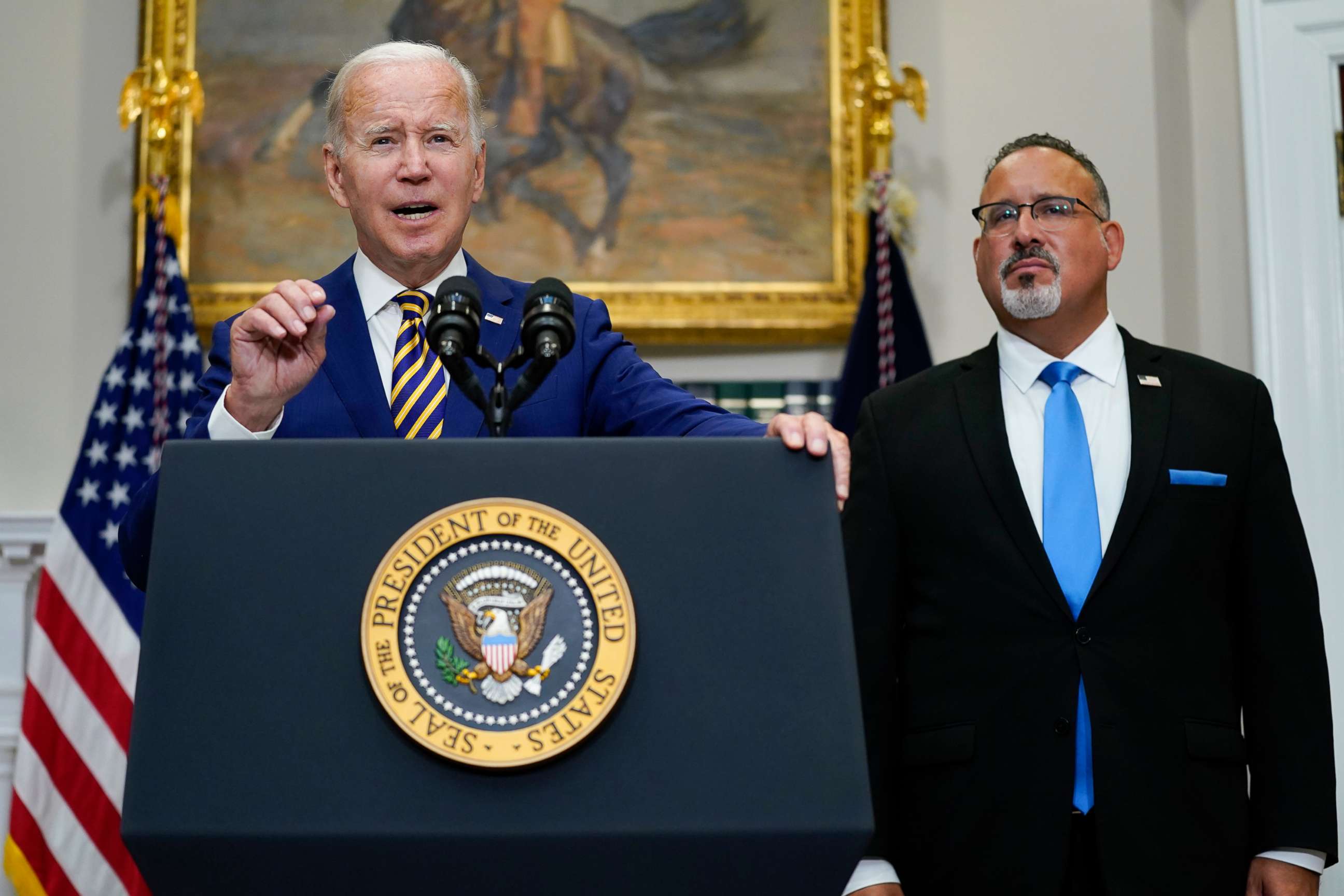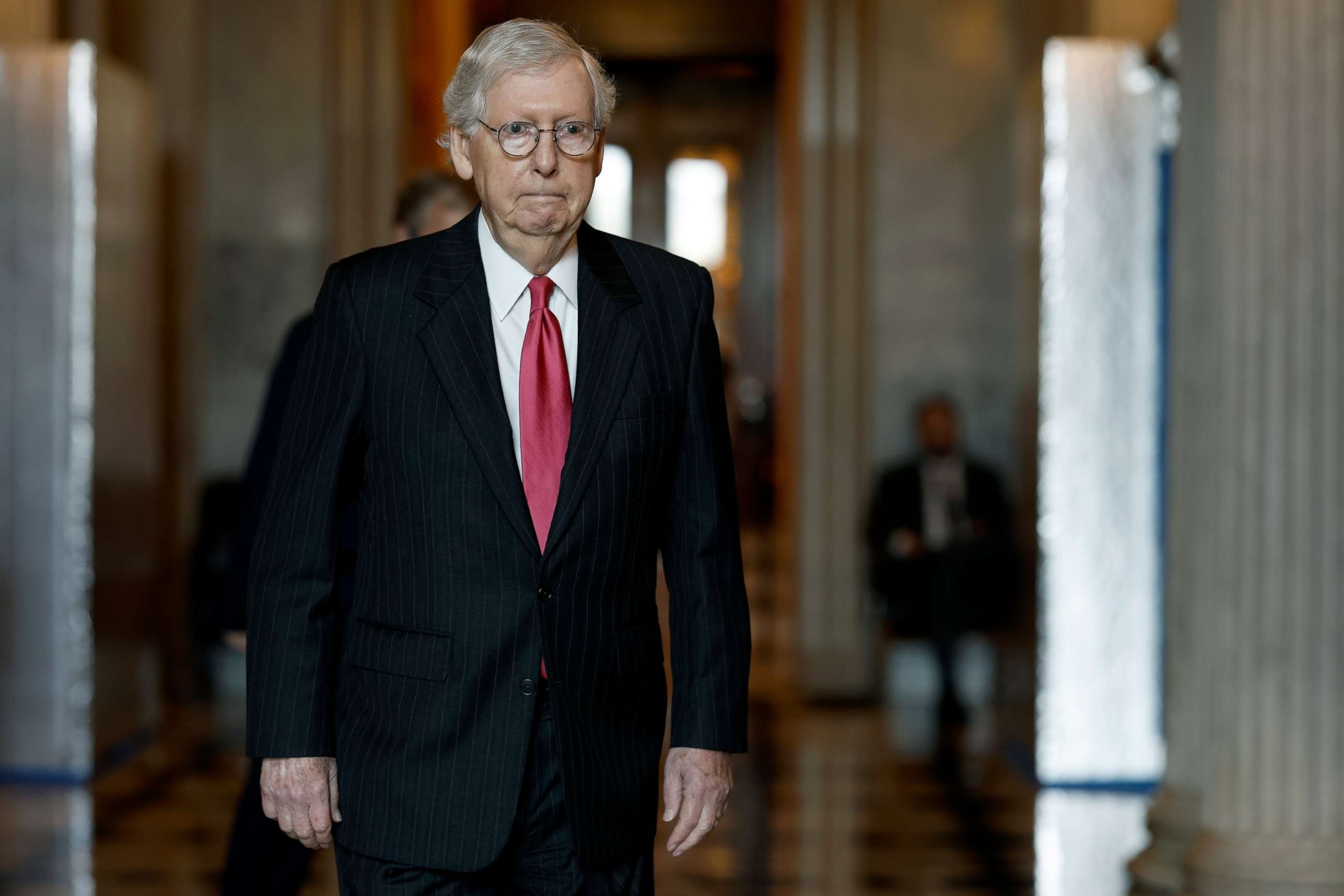Biden's student loan move shaped by intense political pressure, barrage of GOP criticism
He says he's keeping the promise he made on the campaign trail.
President Joe Biden's announcement Wednesday that he would cancel student loan debt for millions of Americans and extend a pandemic-era pause on repayments followed intense pressure from members of his own party and a barrage of criticism from Republicans.
Despite having pledged to quickly forgive debt for many Americans once taking office, his decision came over a year and a half into his presidency -- shaped by economic pressures and political concerns.
"I made a commitment that we'd provide student debt relief and I'm honoring that commitment today," Biden said Wednesday.
But he waited until just one week before the current payment moratorium was due to end at the end of this month to announce he would extend the pause a final time, through the end of the year -- and past the November midterm elections.
Amid the delay, Americans with federal student loan debt faced uncertainty about how to budget for the months ahead, unsure whether they would have to resume repaying their loans.
And the president had come under increasing pressure from within his own party, with prominent Democrats and advocacy groups publicly calling on him to cancel much more than $10,000 per person, what he had pledged to do while running for president.

Senate Majority Leader Chuck Schumer spoke with Biden Tuesday night to urge him to forgive as much debt as possible -- having advocated previously for up to $50,000. Schumer, along with Democratic Sens. Elizabeth Warren and Raphael Warnock, had also spoken with Biden's chief of staff, Ron Klain, and his top economic adviser, Brian Deese, about the topic Friday.
Ultimately, Biden announced those receiving Pell Grants can quality for up to $20,000 in debt forgiveness, and other student loan borrowers who don't have Pell Grants will still have loans forgiven up to $10,000. Both forgiveness options are for people who earn less than $125,000 per year, or $250,000 as a household.
Despite not getting nearly as much as they had pressed for, Schumer and Warren were quick to put out a statement giving Biden political support.
"With the flick of a pen, President Biden has taken a giant step forward in addressing the student debt crisis by cancelling significant amounts of student debt for millions of borrowers. The positive impacts of this move will be felt by families across the country, particularly in minority communities, and is the single most effective action that the President can take on his own to help working families and the economy," they said.
The chair of the Congressional Progressive Caucus, Rep. Pramila Jayapal, gave Biden political cover as well, saying in a statement that while the student loan forgiveness Biden announced is "not as high as we called for" he was still keeping his campaign promise.
"We applaud the President for this critically necessary and unprecedented action that lifts up working people," she said. "We look forward to working closely with the White House to ensure quick relief to 43 million people through this Executive Order."

The long-awaited announcement to cancel comes after Biden, on the campaign trail, pledged "an immediate cancellation of a minimum of $10,000 of student debt per person."
But as the coronavirus pandemic dragged on and inflation hit record levels, poll after poll showed Americans dissatisfied with his handling of the economy. He has shown a reluctance to take steps that could be seen as making inflation worse.
The president had also questioned how much debt he could legally cancel using just his executive authority, without congressional action.
Former Treasury Secretary Lawrence Summers, who served in the Clinton and Obama administrations, said this week that "the worst idea would be a continuation of the current moratorium that benefits among others highly paid surgeons, lawyers and investment bankers."
He called for debt relief to "be given for the first few thousand dollars of debt, and for those with genuinely middle class incomes."
"I hope the administration does not contribute to inflation macro economically by offering unreasonably generous student loan relief or micro economically by encouraging college tuition increases," he tweeted.
As news outlets began to report Tuesday that Biden was considering canceling $10,000 of debt per person, for those with salaries of less than $125,000 annually, the NAACP blasted the president.
Biden's decision, the group's CEO, Derrick Johnson, tweeted, "cannot become the latest example of a policy that has left Black people, especially Black women, behind."
But after Biden's announcement, Johnson issued a new, more moderate statement, saying Biden's plan "takes us one step closer to the NAACP's ultimate goal of alleviating the burden of student debt."
Johnson added, "we've got a ways to go, but the NAACP is proud that we were able to push President Biden to exceed $10,000, bringing us closer to $50,000 and beyond."
Al Sharpton's National Action Network (NAN) said there was still more to do, calling on Biden and Congress to cancel more debt as well as "find new opportunities for people to earn and succeed."
"Black households carry more student debt regardless of their incomes after graduation," the group's statement read. "Approximately one in four Black Americans have negative net worth — meaning their total debt exceeds their total assets. The Administration expects the first $10,000 of debt relief will move over half a million Black Americans from a negative to a positive net worth."

On Wednesday, just hours before Biden's announcement, the administration pushed back on criticism that his proposal does not do enough to address racial disparities, with officials telling reporters they are addressing the issue by increasing the amount eligible for Pell Grant recipients.
"Also by targeting relief to borrowers with the highest economic need, this plan helps narrow the racial wealth gap. That's important because Black students are more likely to have to borrow for school, more likely to take out larger loans and more likely to receive Pell Grants," a senior administration official said.
The announcement came just 76 days until the midterm elections -- after Biden had been in office for 581 days.
Republican Senate Minority Leader Mitch McConnell labeled the move "cynical and outrageous."
"Democrats are literally using working Americans' money to try to buy themselves some enthusiasm from their political base," he said in a statement Wednesday.
GOP Sen. Mitt Romney of Utah calling it a way for Biden to "bribe the voters" and Sen. John Cornyn of Texas dubbing it an "election-year stunt."
"As inflation continues to drain the pockets of Americans, this disastrous policy would incentivize universities to raise tuition and unfairly punish those who sacrificed to pay off their own student loans," Cornyn added.
"Biden owes Americans an explanation on why a truck driver who didn't go to college is now responsible for the student loans of a rich lawyer," Arkansas Republican Sen. Tom Cotton tweeted.
Biden called his plan "responsible and fair" as he responded to criticisms from both sides.
"Now, I understand not everything I'm announcing today is gonna make everybody happy," Biden said as he delivered remarks at the White House on Wednesday afternoon.
"Some think it's too much. I find it interesting how some of my Republican friends who voted for those tax cuts and others think that we shouldn't be helping these folks," he said.
"I will never apologize for helping Americans—working Americans, the middle class," Biden added. "Especially not to the same folks who voted for a $2 trillion dollar tax cut that mainly benefited the wealthiest Americans and the biggest corporations that slowed the economy, didn't do a hell of a lot for an economic growth, and was not paid for and racked up this enormous deficit."
Addressing criticisms from progressives that the cancelation amount is too low, Biden continued to defend the plan.
"It focuses the benefit on middle class and working families," he said. "It helps both current and future borrowers. And it'll fix a badly broken system."
ABC News' Cheyenne Haslett, Rachel Scott, MaryAlice Parks, Mariam Khan and Zunaira Zaki contributed reporting.




